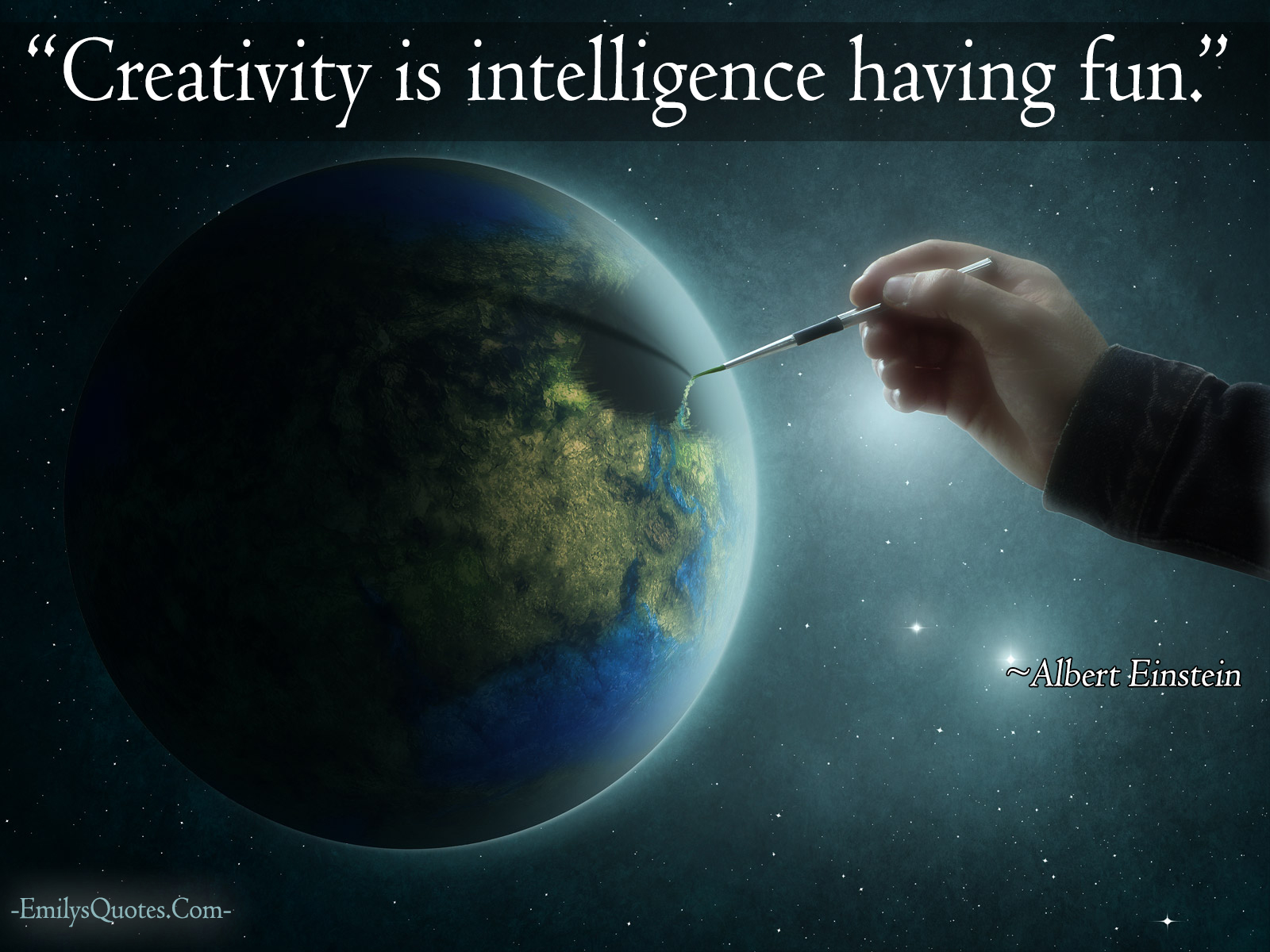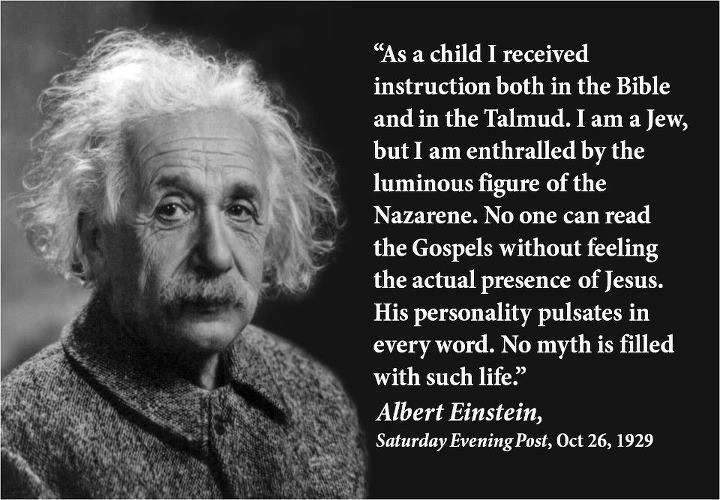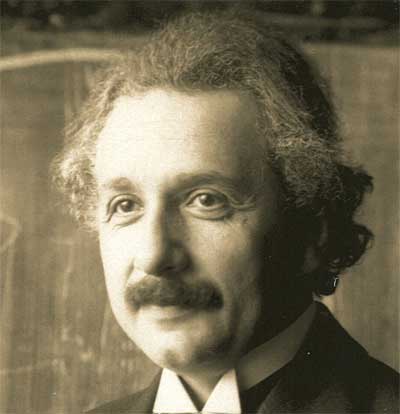
Alan: Einstein did not say that "creativity is intelligence having fun."
But it's consistent with his spirit.
Albert Einstein
Wikiquote
http://en.wikiquote.org/wiki/Talk:Albert_Einstein

"Some Spirit is Manifest in the Laws of the Universe, One that is Vastly Superior to that of Man"
Albert Einstein? Apocryphal? Anonymous?
Dear Quote Investigator: Did Albert Einstein say the following?
Everyone who is seriously interested in the pursuit of science becomes convinced that a spirit is manifest in the laws of the universe – a spirit vastly superior to man, and one in the face of which our modest powers must seem humble.
When I search online for this sentence I get screen after screen of citations from people grinding religious axes, but never a source. I suspect Einstein really did say it, but I should love to be certain and to know the context.
Quote Investigator: In 1936 Albert Einstein sent a letter to a sixth-grade student named Phyllis Wright. The letter was written in Einstein’s native language of German and not in English. His note was complex, multi-layered, and difficult to translate into English. The missive did contain a section that expressed an opinion similar to the one in the text presented by the questioner. Further below QI will present three distinct translations of an excerpt from the letter corresponding to the passage above.
Einstein was replying to a query which was based on a topic of classroom discussion in a Sunday school course. Here is an excerpt from the note of Phyllis [PSAE]:
We will feel greatly honored if you will answer our question: Do scientists pray, and what do they pray for?
Einstein’s note was dated January 24, 1936 and reflected his multifaceted beliefs in the spiritual domain. Here is additional information together with a citation.
The 1999 book “Einstein and Religion: Physics and Theology” by Max Jammer included the following segment from Einstein’s letter translated into English. The efficacy of prayer and the limits of current scientific knowledge were two themes in the text [AEMJ]:
Scientific research is based on the assumption that all events, including the actions of mankind, are determined by the laws of nature. Therefore, a research scientist will hardly be inclined to believe that events could be influenced by a prayer, that is, by a wish addressed to a supernatural Being. However, we have to admit that our actual knowledge of these laws is only an incomplete piece of work (unvollkommenes Stückwerk), so that ultimately the belief in the existence of fundamental all-embracing laws also rests on a sort of faith. All the same, this faith has been largely justified by the success of science.
The letter continued with the following sentence aligned closely with the quotation under investigation [MJAE]:
On the other hand, however, every one who is seriously engaged in the pursuit of science becomes convinced that the laws of nature manifest the existence of a spirit vastly superior to that of men, and one in the face of which we with our modest powers must feel humble. The pursuit of science leads therefore to a religious feeling of a special kind, which differs essentially from the religiosity of more naive people.
The 2002 book “Dear Professor Einstein: Albert Einstein’s Letters to and from Children” printed the child’s query and Einstein’s reply. The editor of this compilation, Alice Calaprice, is a top expert on Einstein’s quotations and also editor of “The Ultimate Quotable Einstein” reference [UQAE].
Here is an excerpt containing the quotation under investigation providing an alternative translation into English [PSAE]:
But also, everyone who is seriously involved in the pursuit of science becomes convinced that some spirit is manifest in the laws of the universe, one that is vastly superior to that of man. In this way the pursuit of science leads to a religious feeling of a special sort, which is surely quite different from the religiosity of someone more naive.
In 1999 an auction catalog featured the typewritten letter in German sent to Phyllis Wright and signed by A. Einstein. The description of the item included another translation [SCAE]:
On the other hand those who are devoted to scientific study are filled with the conviction that nature in its law-abidingness shows the presence of a spirit who is vastly greater than the human spirit and before whom we must humbly confess our own very modest powers. Scientific work, therefore, leads to religious feeling of a unique type which is, of course, different from the religious feeling of less informed men.
In conclusion, there is support for ascribing this saying to Einstein. However, capturing all the nuances of Einstein’s sophisticated German is a difficult task and these translations are imperfect. In addition, small excerpts cannot fully express the intricate and manifold thoughts communicated by Einstein on this topic in his writings and lectures. Thanks for asking this intriguing question.
(Many thanks to Peter Household whose query gave impetus to this exploration. Household has a blog called “Things that have interested me“. Great thanks to the commenter Jesse M. who pointed out the translation given in Max Jammer’s book. Special thanks to the very helpful Barbara Wolff, Einstein Information Officer at the Albert Einstein Archives. Any errors in this post are, of course, mine.)
Update history: On February 7, 2012 this entry was rewritten. The new version of this post includes three translation excerpts. The previous version only presented the text from “Dear Professor Einstein”.
[PSAE] 2002, Dear Professor Einstein: Albert Einstein’s Letters to and from Children, Edited by Alice Calaprice, Page 127-129, Prometheus Books, Amherst, New York. (Verified on paper)
[MJAE] 1999, Einstein and Religion: Physics and Theology by Max Jammer, Start Page 92, Quote Page 93, Princeton University Press. (Google Books preview)
[UQAE] 2010, The Ultimate Quotable Einstein, Edited by Alice Calaprice, Section: On or to Children, Page 80, Princeton University Press, Princeton, New Jersey. (Verified on paper)
[SCAE] 1999, Catalog for Autograph Auction by the R. M. Smythe Company, [Autumn Autograph Auction #192, Date: Tuesday, November 2, 1999 - 11:00 AM, Location: Algonquin Hotel, 59 West 44th Street, New York], Item: 460. (Digital images from Albert Einstein Archives in Jerusalem)
Einstein's Wikiquote Page: http://en.wikiquote.org/wiki/Talk:Albert_Einstein
Einstein Quote Collection: http://einstein.biz/quotes.php

Albert Einstein
Wikiquote
http://en.wikiquote.org/wiki/Talk:Albert_Einstein


It is nothing short of a miracle that modern methods of instruction have not yet entirely strangled the holy curiosity of inquiry.
http://www-history.mcs.st-and.ac.uk/Quotations/Einstein.html

Wikiquote
http://en.wikiquote.org/wiki/Talk:Albert_Einstein

It is nothing short of a miracle that modern methods of instruction have not yet entirely strangled the holy curiosity of inquiry.
http://www-history.mcs.st-and.ac.uk/Quotations/Einstein.html


.jpg/220px-Albert_Einstein_at_the_age_of_three_(1882).jpg)





No comments:
Post a Comment